Electronic Baby Doll Feeding Spoon With Heart
![]()
Best Spoons for Baby
Baby spoons are not just smaller versions of adult spoons (spoiler alert!). In this buying guide for the best spoons for baby, we'll go over how to pick the best baby spoon, frequently asked questions, how to teach baby to use a spoon, tips for baby self-feeding, and the best spoons for both traditional weaning and baby-led weaning. For ages 6-12 months.
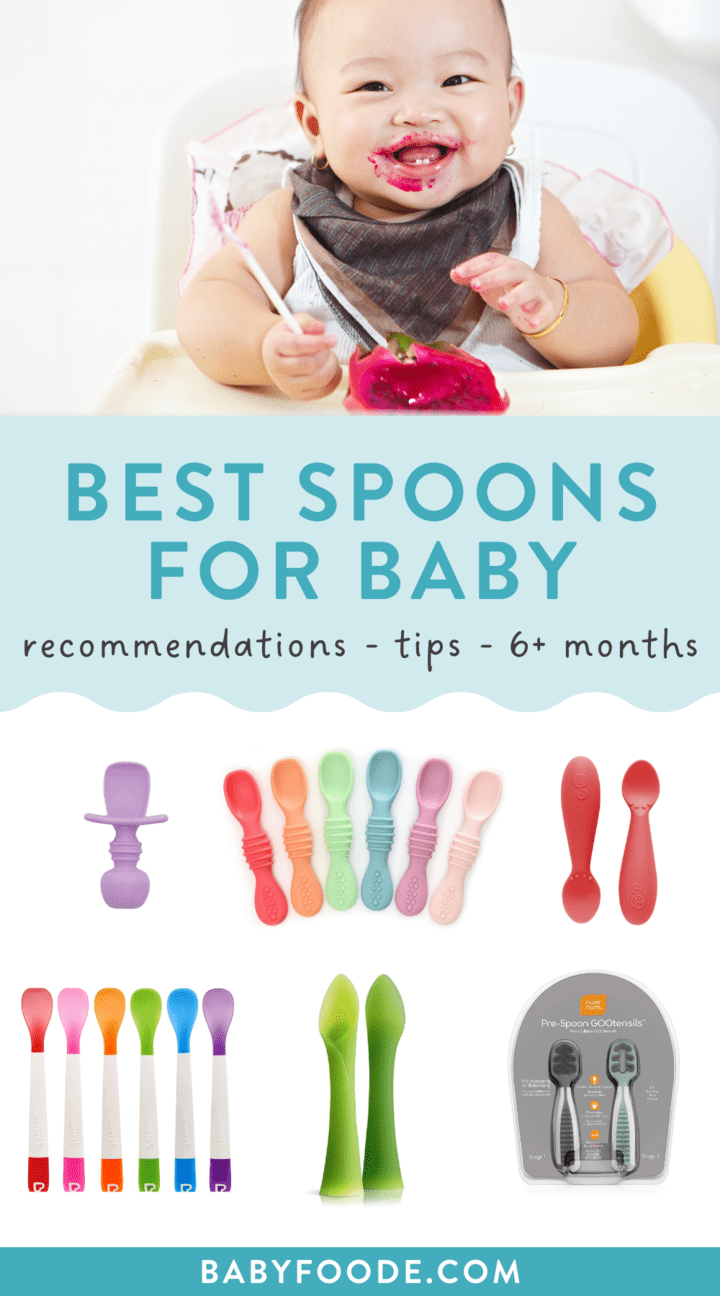
Medically reviewed and co-written by Lauren Braaten, Pediatric Occupational Therapist (OT).
Baby Spoons
Whether you use a traditional weaning approach, baby-led weaning, or a combination of both, at some point your baby is going to need to use utensils, including a spoon. And although a baby eating yogurt with their fingers at 7 months is oh-so-adorable, a child eating yogurt with their fingers at 7 years is not quite as cute. So when can you start introducing a spoon to your baby?
Most babies can swallow a spoonful of puree without choking when they are around 6 months old. Babies can start to use a spoon by themselves at about 10 to 12 months old, according to a report on infant and toddler nutrition from The Centers for Disease Control and Prevention.
While it's true that spoons + food + babies = messes, your little one will continue to get better at using utensils like spoons if you give them opportunities to practice.
Frequently Asked Questions
Do you need a baby spoon?
While you can use a regular spoon in a pinch (and with adult assistance), most pediatricians recommend using a shallow, smaller spoon for feeding your baby. A smaller-sized spoon makes it much easier for your baby to eat from it. Most baby spoons are also made from softer textures, such as food-grade silicone, that won't hurt sensitive gums.
What age does a baby need a spoon?
You can offer your baby a spoon around 6 months of age, just don't expect your baby to be proficient with it. Giving your baby lots of opportunities to practice holding a spoon and bringing it to their mouth from an early age will help develop hand-eye coordination needed for more efficient utensil use later on.
What age can baby use their own spoon?
All babies are different, but typically baby won't be using their own spoon well until they are closer to toddler age, around 12-14 months. Self-feeding will still be messy at this age, especially depending on what foods you offer.
How many spoons do I need for my baby?
You'll want at least two or three baby spoons at first, but likely even a few more. With self-feeding, spoons frequently get dropped on the floor, or they can easily get lost when going out to eat or traveling.
How to Pick the Best Spoon
Buying baby spoons is different in many ways than buying spoons for a toddler or older child. Here are a few tips to consider when picking the best spoon for both your baby's and family's needs.
Feeding Approach –
Although there are spoons that work well for both traditional weaning and baby-led weaning, some spoons are designed more for parent feeding, while others are designed more for baby's self-feeding. Think about what type of approaches you plan to use with your little one and consider trying a few different options as your baby grows.
Size/shape
An infant spoon should be relatively small and narrow so that it fits easily in the mouth. A shallow bowl is helpful so that baby can close their lips and easily clear food off the spoon. Shorter, thicker handles are easier for your baby to self-feed with, while longer, thinner handles help parents feed purees.
Materials
You'll want a material that provides structure and is firm, yet flexible and gentle enough for baby's mouth. Food grade silicone is a popular choice that also allows your baby to "teethe" a little on the spoon. Stainless steel and plastic may also work for your baby, especially if the spoon has more than one texture or material.
Style
The variety of colors, designs, and textures are endless these days. We like spoons that offer "built-in" teething options, such as added texture via bumps or ridges on the handles.
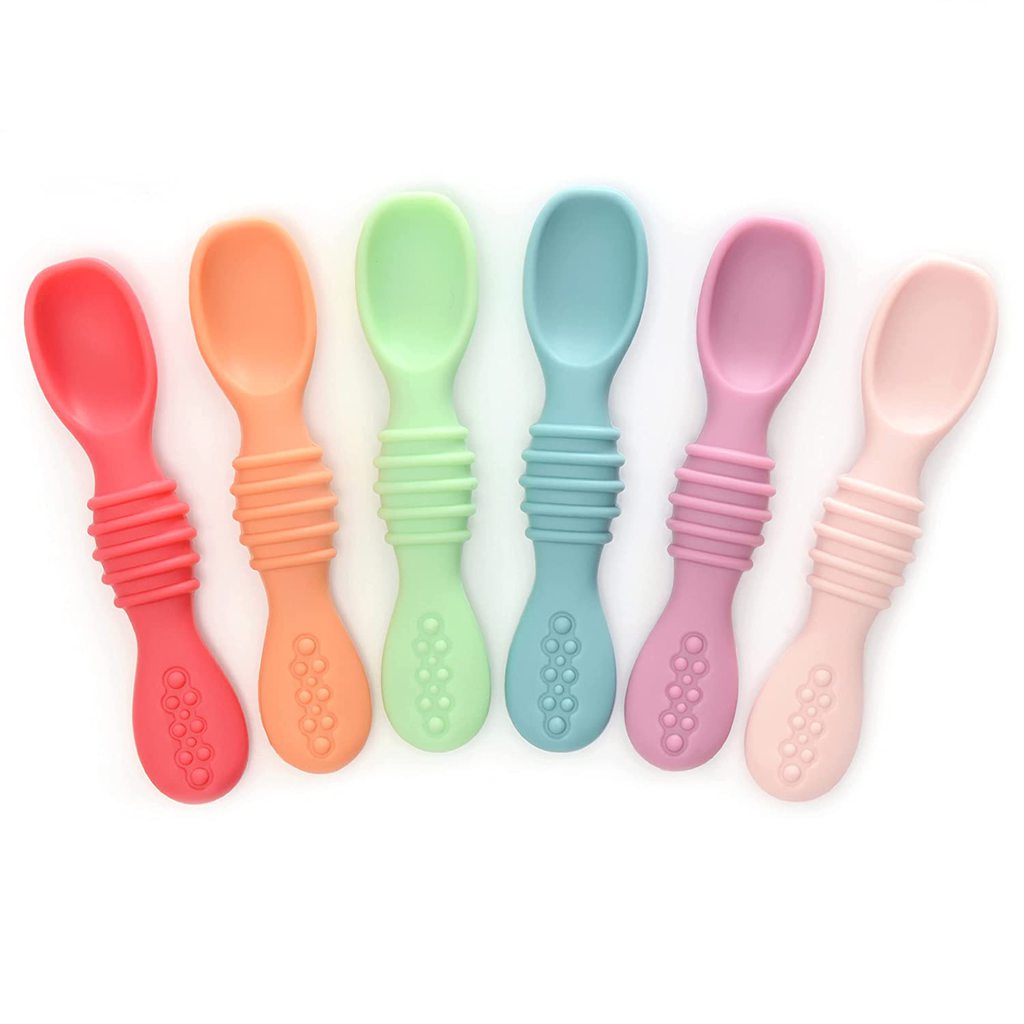
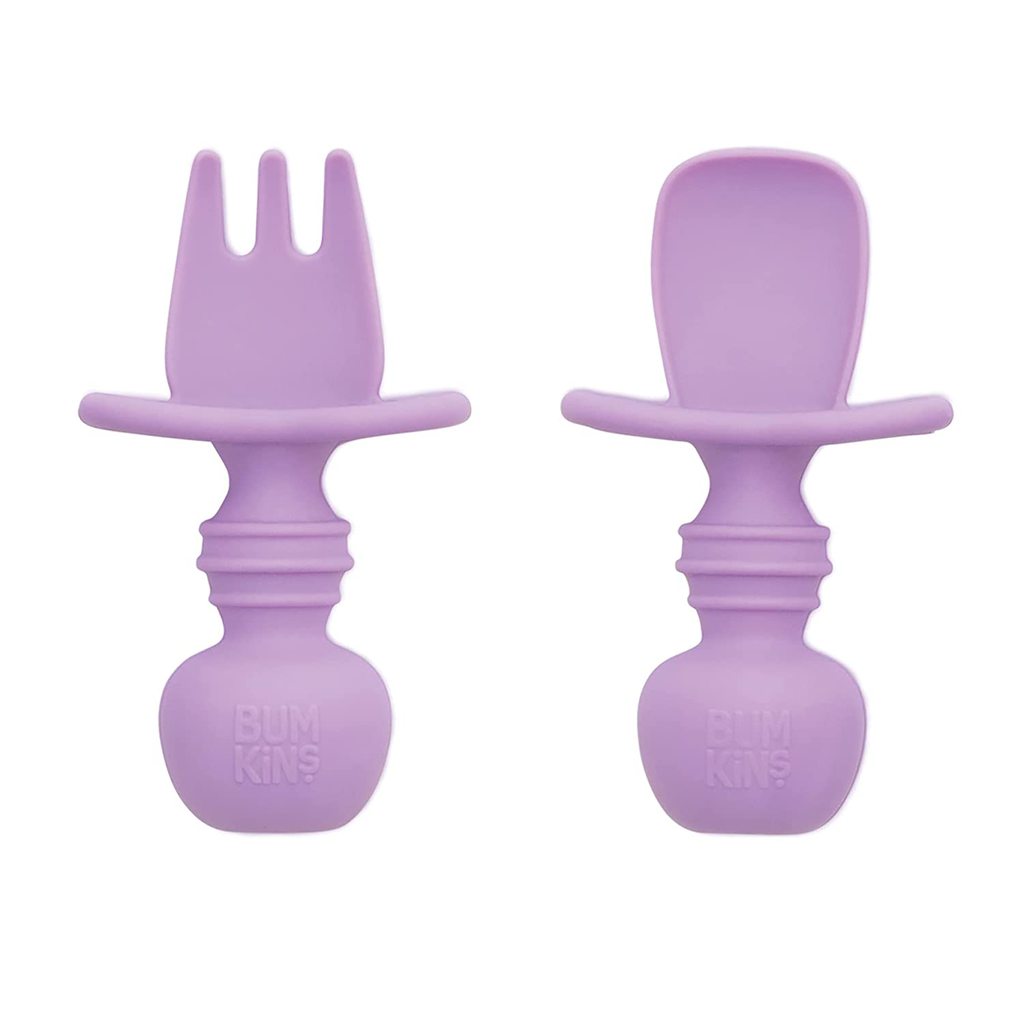
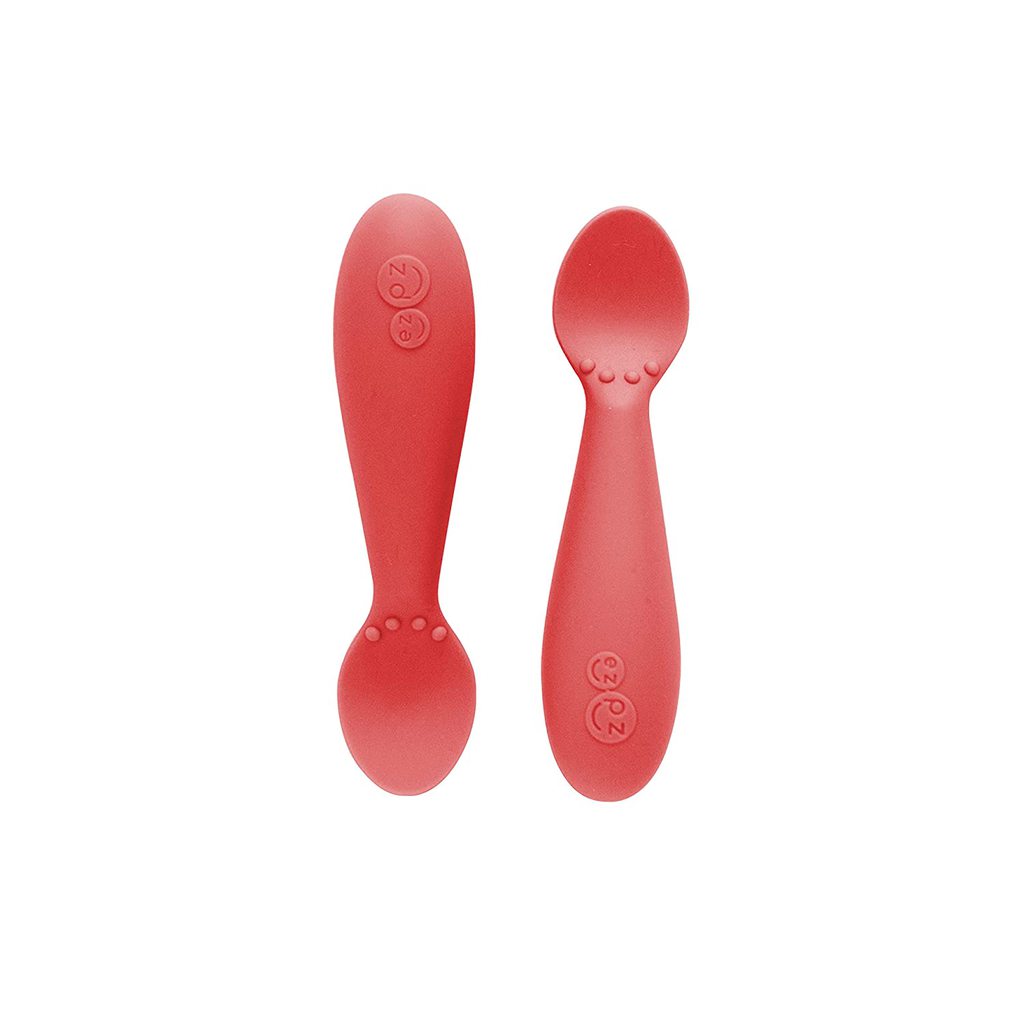
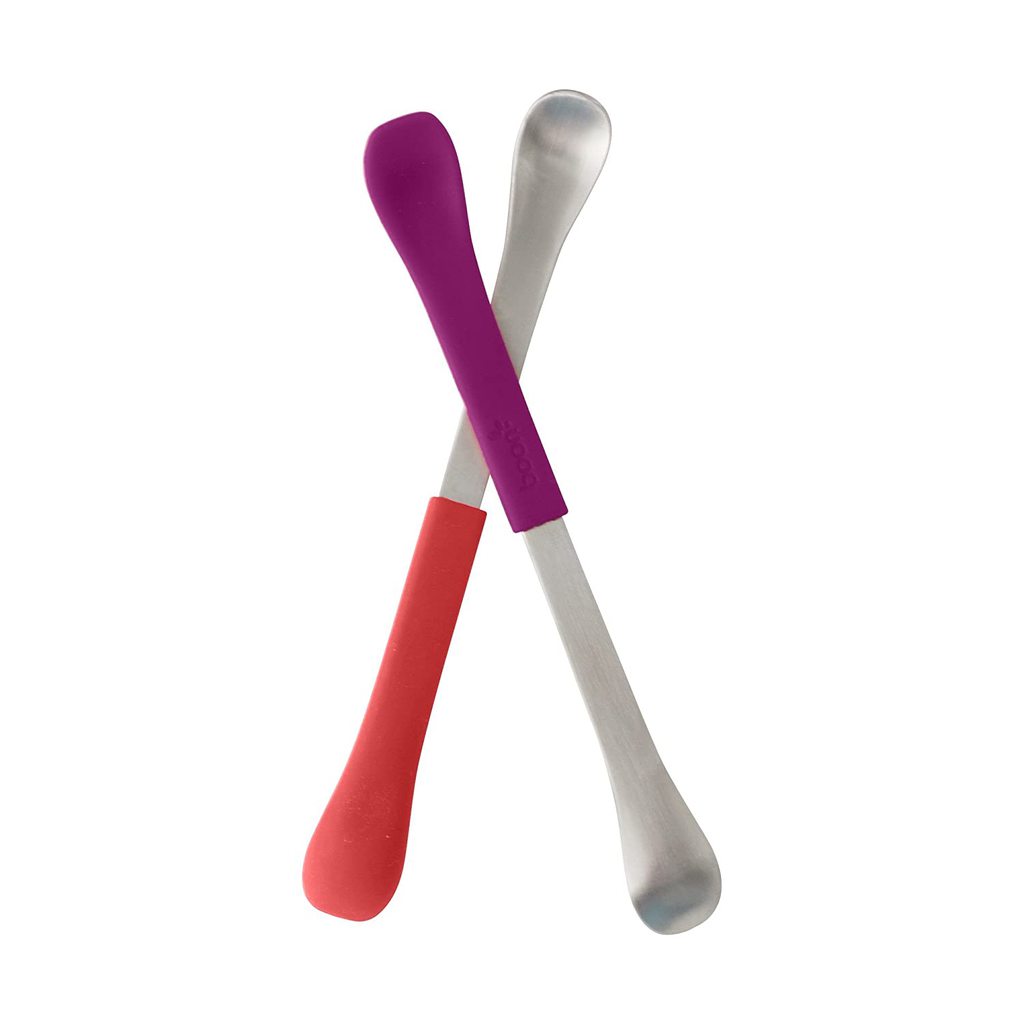
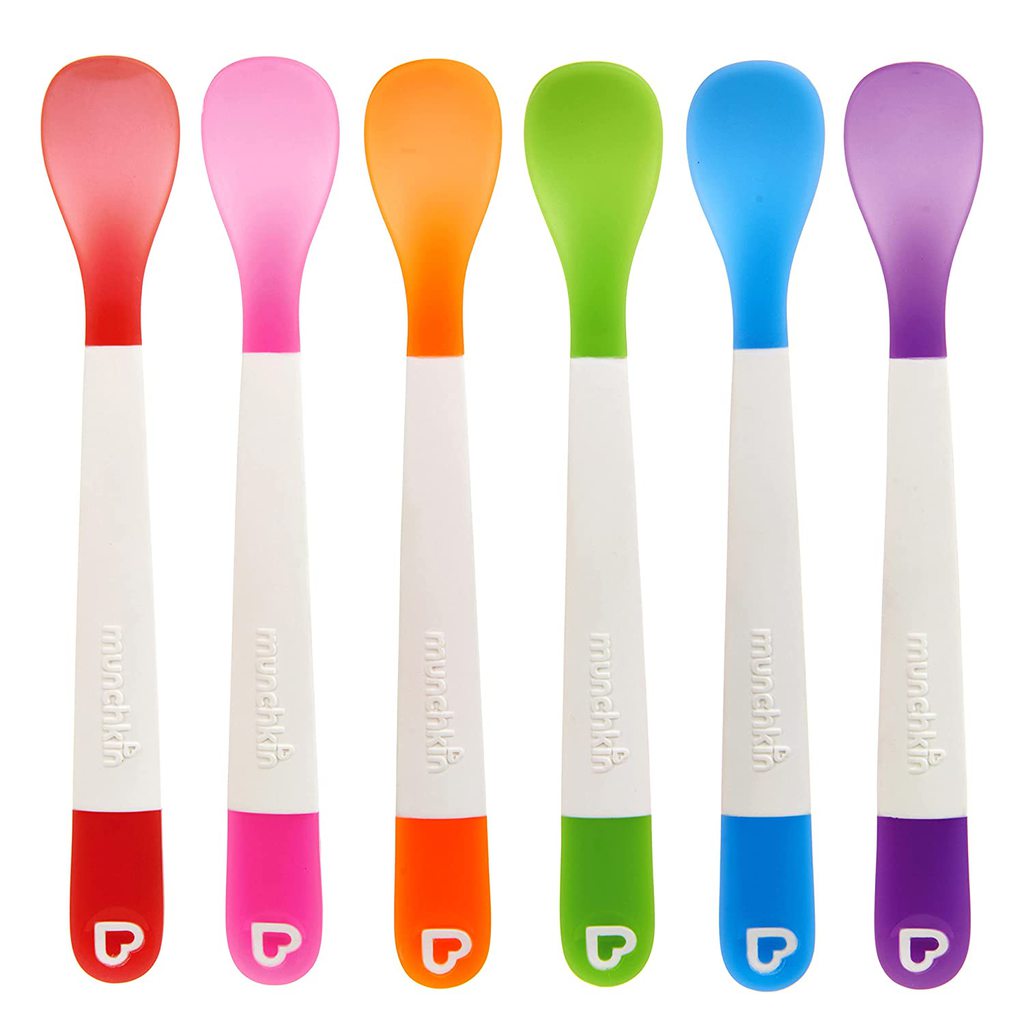
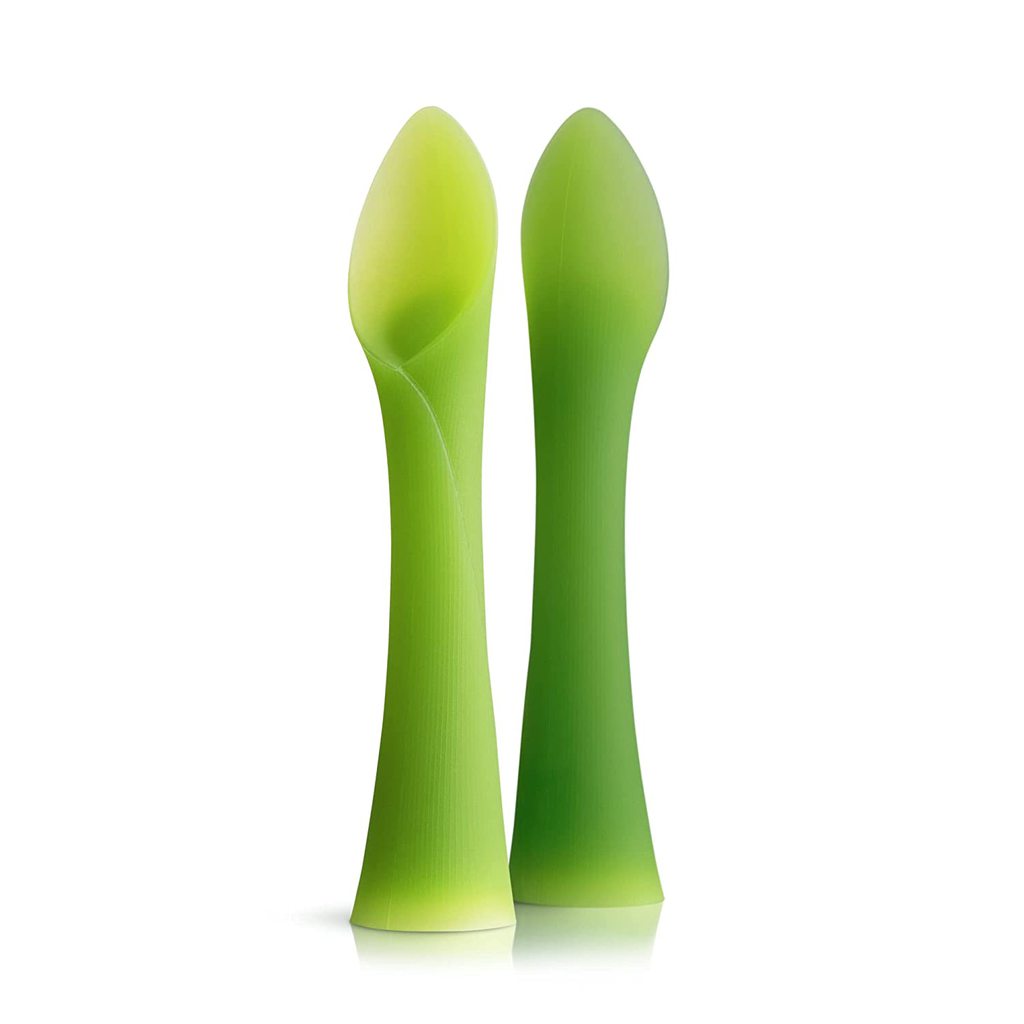
Best Spoons for Self-Feeding Babies
- NumNum Pre-Spoon GOOtensils
- Olababy Soft-Tip Training Spoon
- Bumkins Utensils
- PrimaStella Silicone Rainbow Spoon Set for Babies
Best Spoons for Purees
- Munchkin 6 Piece Lift Infant Spoons
- WeeSprout Silicone Baby Spoons
- Boon Swap 2-in-1 Baby Spoon
- ezpz Tiny Spoon
- Avanchy Stainless Steel Infant Spoons
How to Teach Baby to Use a Spoon
- As with starting solid foods in general, make sure your baby has good support at their head, trunk, and feet, ideally via sitting in a high chair or booster chair.
- Serve thicker purees that will stick easily to the spoon to start with, such as oatmeal, mashed sweet potatoes, or greek yogurt.
- Model dipping the spoon in the puree and bringing it up to your mouth. You can do this with your baby's spoon before offering it to them and with your own food during the meal.
- You can simply hand baby the spoon and see what they'll do, but you may also want to consider pre-loading the spoon to help baby get started. Just scoop up a small amount and either set the spoon on the tray for your baby to grasp or place the spoon in their hand. This may help decrease frustration with unsuccessful attempts in the early stages of learning.
- Don't worry if your baby doesn't seem interested in using the spoon or is more distracted by throwing it off their tray at first. You can always remove the spoon and offer it again at another meal. Your baby can still get in great practice with hand-eye coordination needed for spoon-feeding by dipping their fingers in a bowl and slurping the puree off of them!
Tips for Baby Self-Feeding with Spoons
- Be patient. It takes a lot of practice to learn to use utensils with ease. Self-feeding using both fingers and a spoon at meals is common for babies and even toddlers until they become efficient.
- Rotate, rotate, rotate. If your baby wants to be in control but can't seem to get the spoon to his mouth fast enough, set yourself up with 2-3 spoons to use throughout the meal. Load and then re-load each spoon after a bite, handing the spoon to your baby one at a time.
- Start small. Only put a small amount of puree in your baby's bowl to start with, in order to prevent the mess from getting too crazy.
Best Spoons for Baby
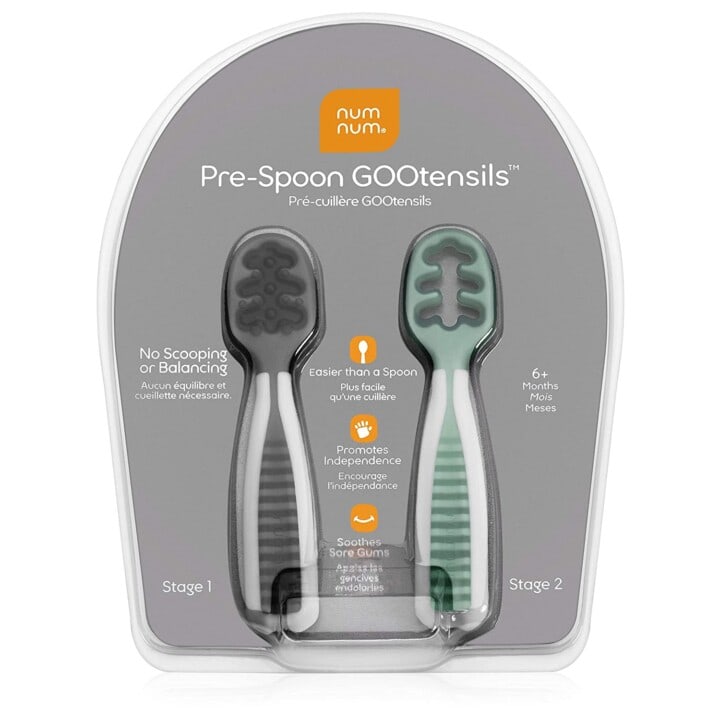
NumNum Pre-Spoon GOOtensils
We love the NumNum Pre-Spoon GOOtensils for baby-led weaning. No scooping, no balancing, and best of all, no wrong way to hold it!
- Set includes Stage One GOOtensil for beginners (also acts as a teether for sore gums) and Stage Two GOOtensil for toddlers capable of the food-to-mouth motion
- Thicker, contoured handled spoons designed to comfortably and securely fit a baby's hand
- 100% BPA, PVC and phthalates free and dishwasher safe
- Recommended for ages 6-18 months
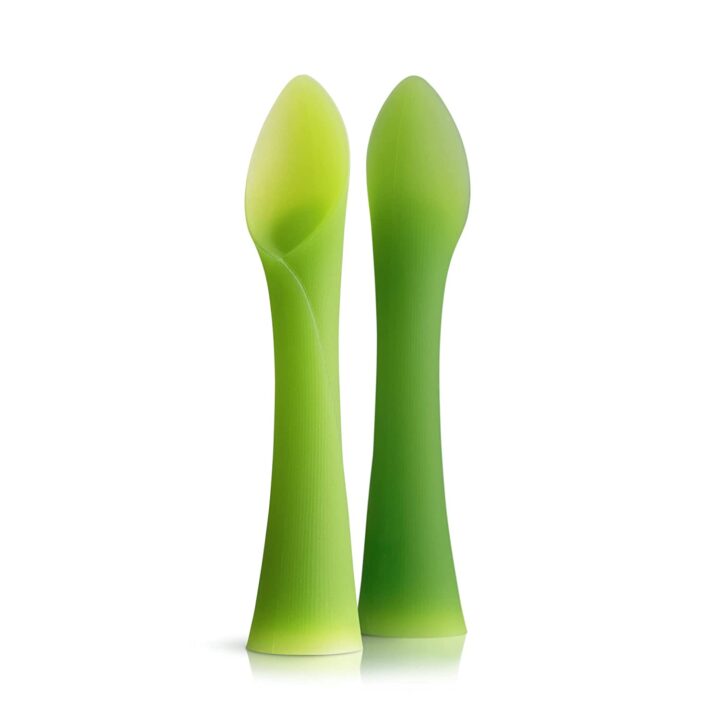
Olababy Soft-Tip Training Spoon
The adorable Olababy Soft-Tip Training Spoon feels like a toy, looks like a plant, and works great as a teether. This spoon works great for both baby-led weaning and traditional weaning approaches.
- A shallow bowl design promotes lip closure for oral motor development
- Ergonomically designed for baby's hands
- The spoon base allows for hygienic, upright placement on any surface
- 100% food-grade silicone, BPA, latex, and phthalate-free, as well as dishwasher safe
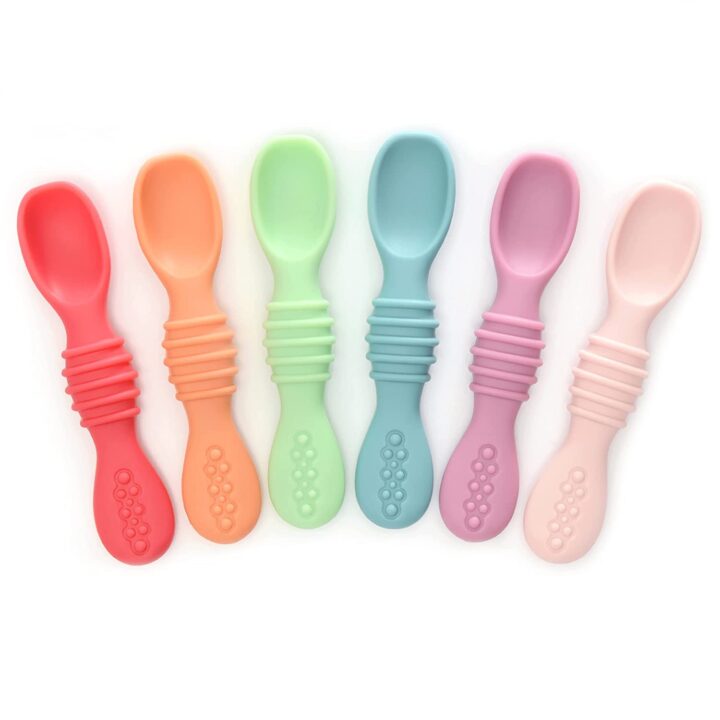
PrimaStella Silicone Rainbow Spoon Set for Babies
These beautifully colored silicone spoons by PrimaStella make a perfect start for spoon-feeding. With one end for dipping, the other end for scooping, and the whole spoon soft and flexible enough for chewing, these spoons are a must-have for baby-led weaning.
- Textured middle handle for easy gripping for babies and toddlers
- Soft silicone design protects sensitive gums and new teeth
- 100% food-grade silicone with no additives and Lead, BPA, PVC and Phthalate Free
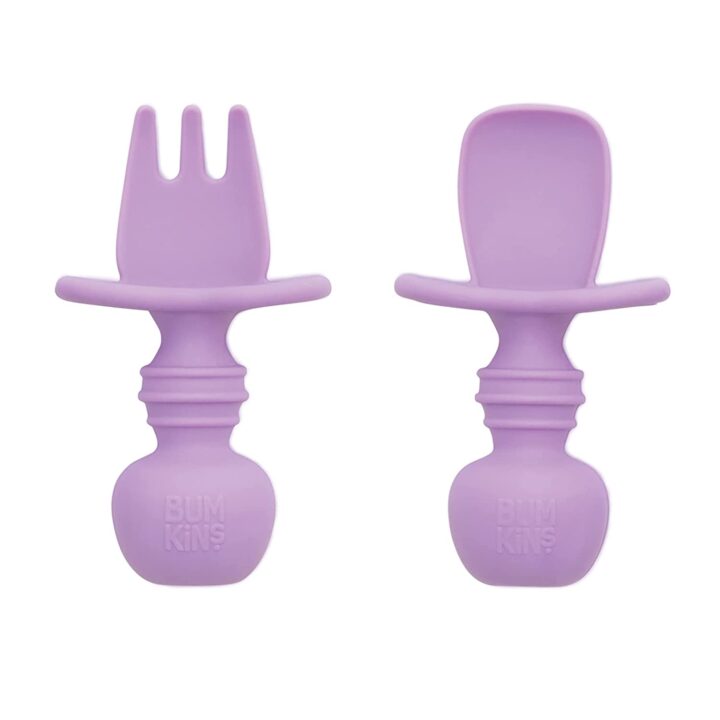
Bumkins Utensils
The Bumkins Chewtensils Fork and Spoon Set is perfect for helping guide little ones to self-feeding. Their small, shorter size allows your baby to easily dip them into food, then practice the motion of self-feeding.
- The back of the spoon head has sensory bumps to stimulate gums
- Ventilated choke barrier for extra safety
- 100% food-safe silicone, BPA-free and dishwasher safe
- Recommended for ages 6 + months
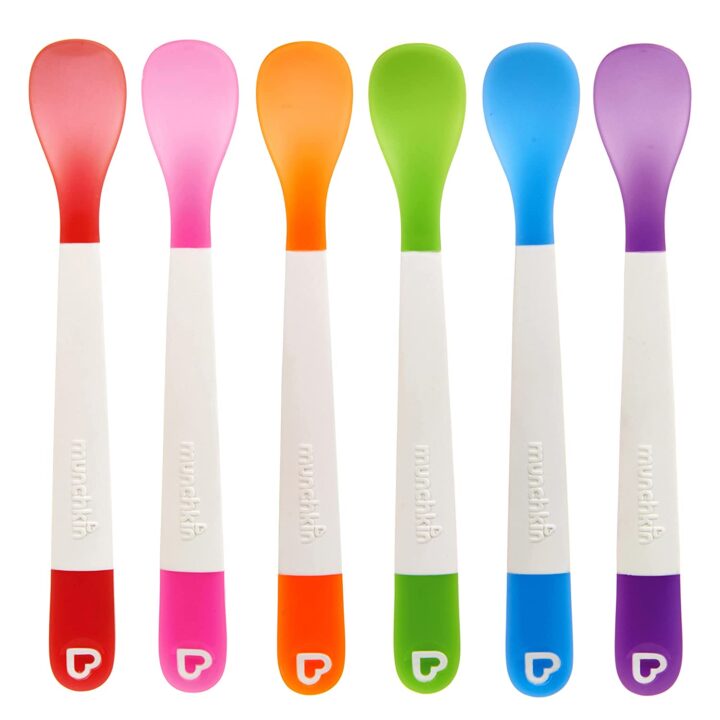
Munchkin 6 Piece Lift Infant Spoons
All parents can appreciate the design of these Munchkin Lift Infant spoons. The base of the spoon keeps the tip elevated off of surfaces when set down, so baby's spoon comes into contact with less germs AND your tabletop stays cleaner.
- Soft plastic is gentle on baby's face and gums
- Includes 6 spoons with fun translucent colors
- BPA-free and top rack dishwasher safe
- Recommended for ages 4+ months, great for starting with traditional weaning
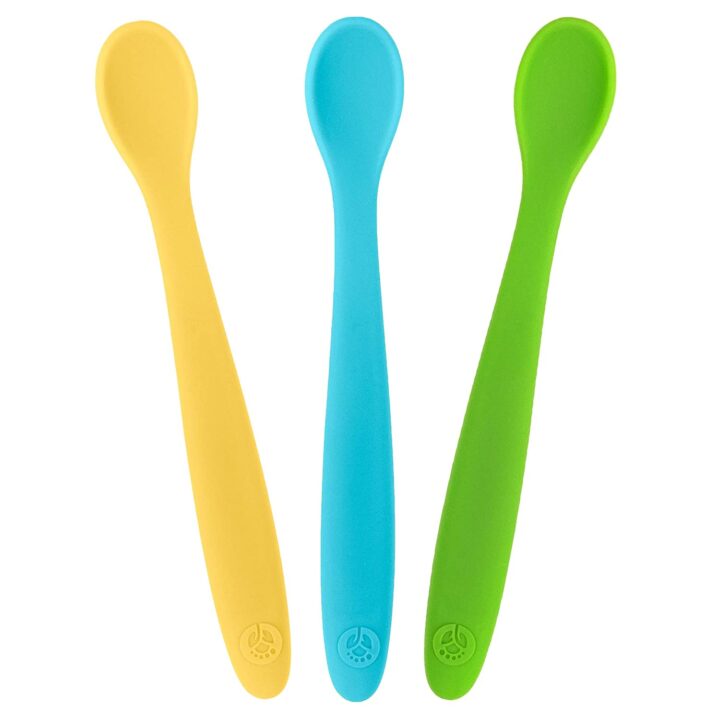
WeeSprout Silicone Baby Spoons
These unique, flexible spoons can bend in every direction, making it easy to position and adjust baby's spoon to fit every feeding situation. The soft tip is gentle on the gums and developing teeth.
- The smooth design prevents water and food from getting trapped
- 100% food-grade silicone
- Perfect size for small mouths and starting baby on puree foods
- Dishwasher friendly and boil-proof for an extra deep clean
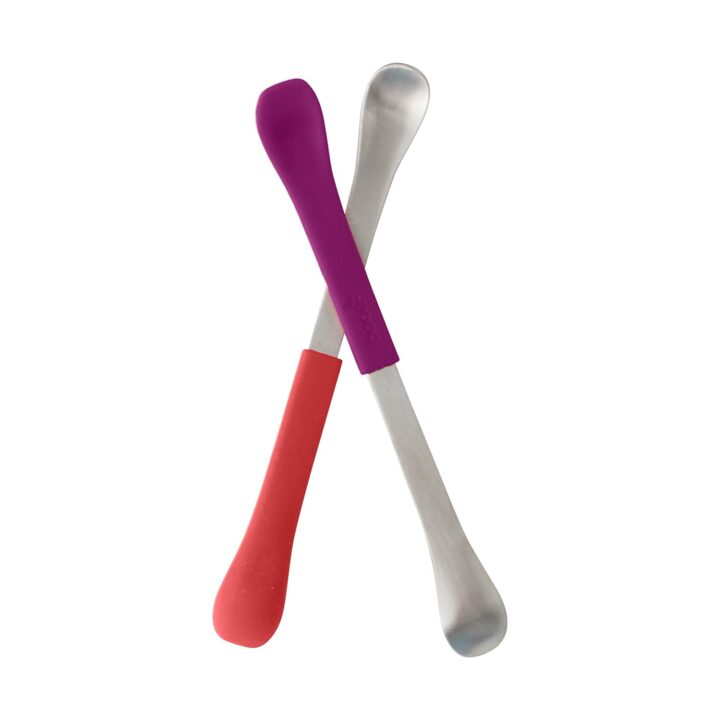
Boon Swap 2-in-1 Baby Spoon
These dual-ended, minimalist style spoons offer two feeding texture options, with a soft and a rigid end. Their small size makes them perfect for first-time feedings using a traditional weaning approach.
- Made of durable food-grade silicone and stainless steel
- Angled to easily scoop baby food out of jars or bowls
- Dishwasher safe and easy to clean
- Recommended for ages 4+ months

ezpz Tiny Spoon
The ezpz Tiny Spoon is designed with a variety of unique features that make it an incredibly functional and developmentally appropriate spoon for baby's first foods. This spoon works great for both traditional weaning and baby-led weaning.
- Soft silicone protects baby's developing teeth
- Slight arc of spoon can be used for dipping and scooping
- Sensory bumps on the spoon bowl activate sensory awareness to decrease gagging and choking
- Bumps on the bottom of the spoon stabilize the spoon when at rest

Avanchy Stainless Steel Infant Spoons
This Avanchy spoon is a perfectly sized spoon for babies. Designed with parents in mind, it has a smaller head and longer handle that's ideal for traditional spoon-feeding.
- A thinner scoop and long handle promote easier spoon-feeding
- Superior stainless-steel quality
- Dishwasher safe and BPA free
Source: https://babyfoode.com/blog/best-spoons-for-baby/
0 Response to "Electronic Baby Doll Feeding Spoon With Heart"
Publicar un comentario